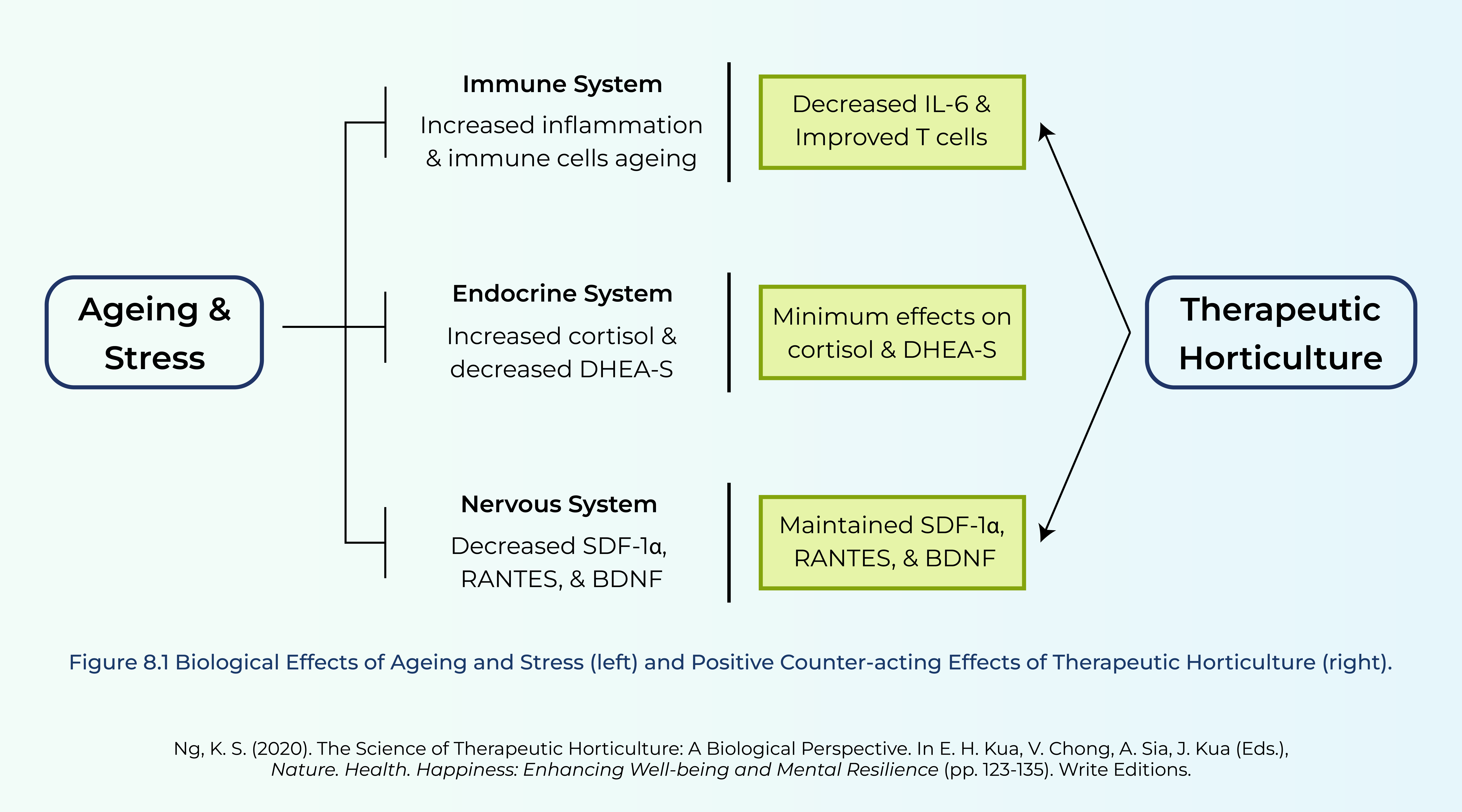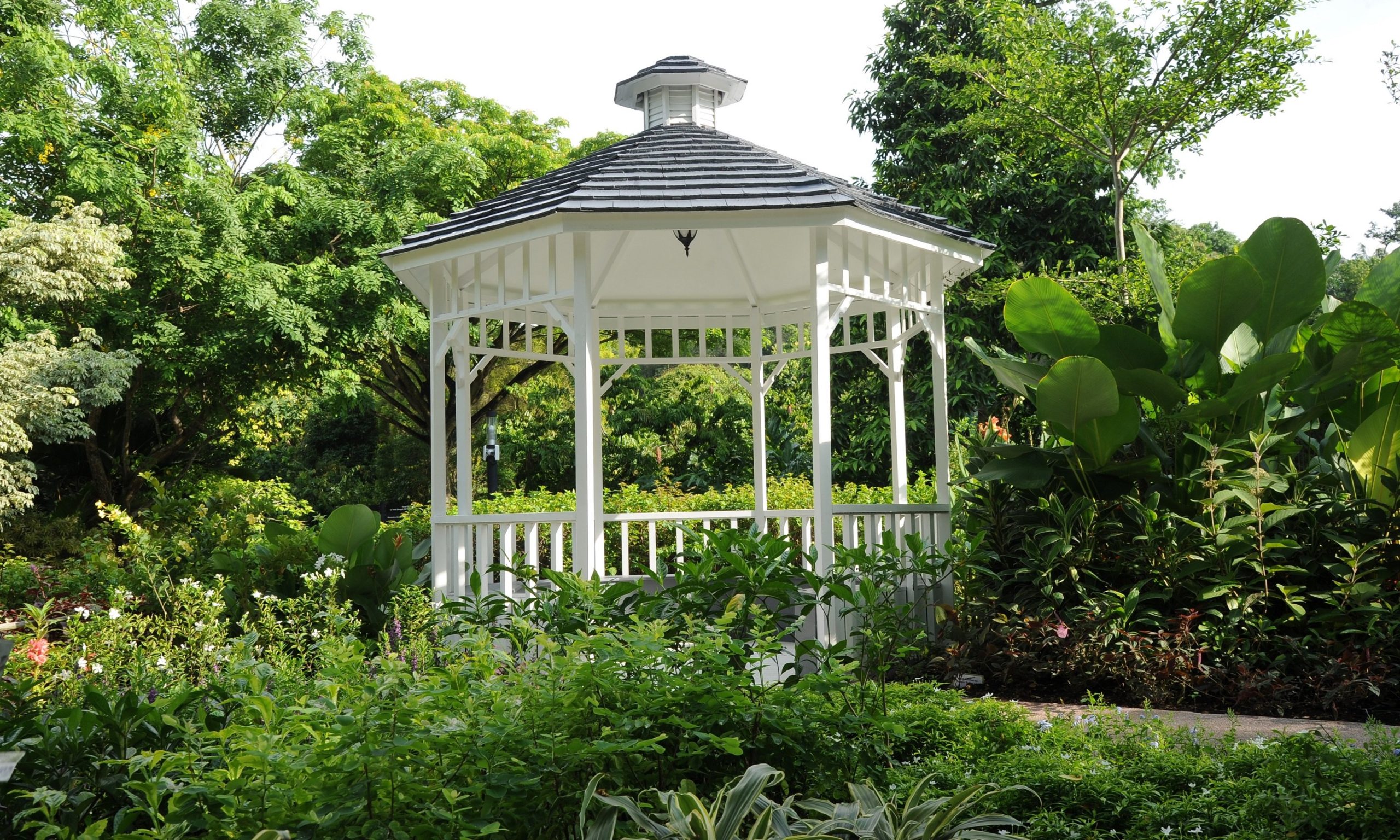Gardening is Good for Physical and Mental Health
Above indisputable benefits for the environment, there is also increasing interest on the impact of gardening on physical and mental health. With Singapore’s ageing population, there is a need for health-promoting infrastructures in communities, especially near estates with more elderly populations.
Mind Science Centre conducted a randomised controlled trial (RCT) to investigate the efficacy of horticultural therapy to improve the physical and mental well-being of seniors. Our research found improved immune response, life satisfaction, memory, psychological well-being, and social connectedness in older adults who participated in horticulture therapy (Kua & Ng, 2022). These findings became the foundation for National Parks’ project on developing specially designed therapeutic gardens across Singapore.
Gardening and Horticulture Therapy
Therapeutic horticulture refers to the process of enhancing participants’ well-being through plant-related activities. Previous research have shown evidence that garden settings prevent cognitive decline, depression and stress, and also improve social engagement in the elderly.
In the programme curated by Mind Science Centre and National Parks, participants planted vegetables, learnt about maintaining and harvesting vegetables and herbs, created nature-based artworks, and visited the Singapore Botanical Gardens, Sungei Buloh Wetland Reserve and Gardens by the Bay. These programmes were designed to support mental well-being through active interaction with nature (Kua & Ng, 2022).
Impact of Gardening on Biomarkers

For our study, blood samples were collected before, at 3-month, and at 6-month of intervention. Some changes in biomarker levels were observed:
- Significant reduction in plasma IL-6 level in the horticulture therapy group
- Significant reductions in plasma CXCL12 (SDF-1α), CXCL5 (RANTES), and BDNF in the control group, while levels were maintained in the horticulture therapy group
Reduced plasma IL-6 levels suggest improved inflammatory responses and slower ageing of the immune T cells. This suggests improved immune response in the horticulture therapy group.
Maintained SDF-1α and RANTES levels are also notable as these suggest better blood supply to the brain and ability to repair and protect the brain from degeneration, as compared to the control group (Ng et al., 2018; Ng, 2020).
Horticulture Therapy Improves Life Quality and Social Connectedness
Our study also found improvements in individual mental health with participants reporting improvements in their quality of life. Similarly, data analyses showed a significant increase in the mean scores of the psychosocial scale. Therapeutic horticulture promotes interactions in older adults who stand to benefit from more meaningful recreation and social connectedness (Ng et al., 2018; Sia, 2020).
We gathered that participants experienced positive changes in their attitudes and mindsets, reflecting a sense of hope, optimism, and self-efficacy. These are characteristics of resilience that is key to supporting healthy communities (Sia, 2020).
These findings show that horticultural therapy can be implemented as a community intervention to enhance the well-being of older adults.
Implementation in Singapore: City in Nature

Therapeutic Garden at HortPark (Image source: National Parks)
Horticulture therapy has the potential to be implemented as a nationwide health promotion strategy as Singapore has over 350 urban parks and four nature reserves well distributed across the island. This proximity offers a unique opportunity for people to easily access and derive benefits from interactions with nature (Sia, 2020).
The Therapeutic Garden @ HortPark was built and launched in 2016 to commemorate the collaboration between the Mind Science Centre and National Parks. Since then, more therapeutic gardens can be found across the island, including Tiong Bahru Park, Bishan-Ang Mo Kio Park, Choa Chu Kang Park, and more.
These specially designed gardens provide a holistic rehabilitative environment to relieve stress and improve the mental well-being of all visitors. More information on therapeutic gardens across Singapore can be found here.
References
Ng, K., Sia, A., Ng, M., Tan, C., Chan, H., Tan, C., Rawtaer, I., Feng, L., Mahendran, R., Larbi, A., Kua, E., & Ho, R. (2018). Effects of Horticultural Therapy on Asian Older Adults: A Randomized Controlled Trial. International Journal of Environmental Research and Public Health, 15(8), 1705. https://doi.org/10.3390/ijerph15081705
Kua, E. H. & Ng, K. S. (2022). Therapeutic Gardens. In E. H. Kua & R. Mahendran (Eds.), Ageing with Dignity: A 10-year Study on Positive Ageing and Dementia Prevention in Singapore (pp. 39-42). Write Editions.
Ng, K. S. (2020). The Science of Therapeutic Horticulture: A Biological Perspective. In E. H. Kua, V. Chong, A. Sia, J. Kua (Eds.), Nature. Health. Happiness: Enhancing Well-being and Mental Resilience (pp. 123-135). Write Editions.
Sia, A. (2020). Green Spaces in Cities. In E. H. Kua, V. Chong, A. Sia, J. Kua (Eds.), Nature. Health. Happiness: Enhancing Well-being and Mental Resilience (pp. 197-211). Write Editions.

